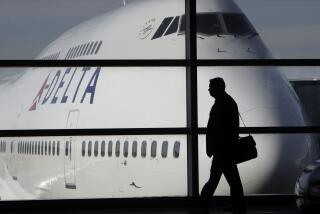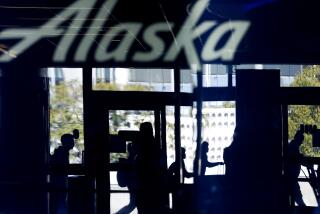Grounding Texas Air Would Cripple U.S. Airline System, Experts Warn
NEW YORK — If Texas Air Corp. loses its license to operate as a result of the Transportation Department’s investigation of its finances, the nation’s airline system would be thrown into chaos.
Although most observers said Thursday that they doubt any penalty against the airline holding company would be that extreme, the loss of 20% of the nation’s air service at one stroke would have effects similar to those of the grounding of all DC-10 airliners for safety reasons a decade ago and the air controllers’ strike in 1981. In both cases, the number of flights was greatly reduced.
Alfred E. Kahn, chairman of the now-defunct Civil Aeronautics Board in 1978 when Congress approved deregulation, said in an interview Thursday that “it would be quite a mess” if Texas Air’s Eastern and Continental airlines were grounded. “Who . . . (would) take care of passengers of Eastern and Continental?” he asked. “It is almost unimaginable.”
The concern that Texas Air’s license may be in jeopardy stems from the announcement Wednesday by the Transportation Department that it is looking into whether the Houston-based airline holding company, which had losses of $466 million last year, is “fit, willing and able” to carry passengers safely. The result could be decertification.
At the same time, the Federal Aviation Administration, an arm of the Transportation Department, said it was fining Eastern $823,500 for violation of safety rules. The airline took six of its 267 planes out of service Thursday because of “relatively minor “ safety deficiences found by FAA investigators.
Meanwhile, Eastern employees expressed relief that the cloud that has hung over their airline might finally begin to dissipate if the safety-related accusations are resolved. Although some passengers chose other carriers Thursday, most appeared to be unfazed by Eastern’s difficulties.
Within hours of Wednesday’s regulatory moves, Eastern ran full-page ads in several newspapers saying that it welcomes the investigation because it will prove that the airline is operating safely. It charged that it had been unfairly treated by federal authorities.
Some analysts said actions less serious than decertification might be taken by the regulators. These could include federal appointment of a “czar” to temporarily oversee Texas Air’s finances or forcing the company to divest itself of either Eastern or Continental.
“I am not predicting that it will happen,” said Lee R. Howard, executive vice president of Airline Economics, a Washington consulting firm, “but in the event of decertification, bedlam would exist temporarily. Other carriers simply could not move in that rapidly to fill the gap, and so people who planned to travel on that carrier would be in trouble.”
Major difficulties would arise because the nation’s airlines are now flying about 70% full and analysts said it would be virtually impossible for them to quickly accommodate the added traffic. Eventually, however, Texas Air’s competitors, which fly on most of its routes, would take up the slack, the analysts said.
“It’s like the subway strike,” one said. “It is a pain in the neck, but you can take the bus.”
Kahn, now a professor at Cornell University and widely known as the “father” of airline deregulation, said the labor unions at Eastern are behind the current controversy. The matter has its roots in Texas Air Chairman Frank Lorenzo’s actions when Continental’s pilots went on strike in 1983.
Just before the strike, Lorenzo had taken the airline into bankruptcy and he later hired replacements for the striking pilots. Today, Continental, having emerged from bankruptcy proceedings in 1986, is a non-union carrier. Lorenzo also founded New York Air, now part of Continental, as a non-union carrier.
Texas Air purchased Eastern, which is unionized, in 1986 and is involved in a bitter fight with its machinists union, from which it wants major concessions. Members of Congress, prompted by the unions, have been calling for the safety investigation and that is understood to have applied the pressure that resulted in the Transportation Department’s actions Wednesday.
But Kahn predicted that “no severe derelictions will be found” in the safety investigation of Eastern. “After all, Lorenzo is not suicidal.”
Meanwhile, Transportation Secretary James H. Burnley IV said Thursday in a television interview that the federal investigations of Texas Air and Eastern should be considered “a shot across the bow” of any airline that might compromise safety due to financial pressures.
In an appearance on NBC-TV’s “Today” show, Burnley also said passengers should be reassured by the safety probe of Eastern, adding that it could bring about “the safest 30 days in the history of that airline or almost any airline in U.S. history.” He said he would not hesitate to fly on Eastern.
Passengers waiting for the Eastern shuttle at New York’s La Guardia Airport on Thursday seemed to agree.
“I’m not overly concerned,” said Geoffrey K. Reiss, office manager for Spy, a New York-based magazine. “I hope that now they are going to be responsible and be more concerned about their flight inspections. This is maybe a cynical view but I would hope that the day after, an announcement like yesterday’s would make them be extraordinarily careful.”
Some Avoiding Airline
Don Simkin, a dentist on his way to Boston, said, “I don’t think the chances are any worse on Eastern.”
But over at the terminal of the Pan Am Shuttle, Eastern’s competitor, some passengers said they were avoiding Eastern.
“I wouldn’t touch Eastern today,” said Jim Keating, who was taking Pan American home to Boston. “I took them to Florida over the weekend and I’m thankful I’m OK.”
While some passengers may have chosen to fly Pan Am in order to steer clear of Eastern, Pan Am officials said they could see no significant increase in their business.
Eastern employees at La Guardia were generally hesitant to comment on the disclosures, although a few criticized Lorenzo.
“I think it’s about time that Lorenzo himself was investigated,” a ramp service technician said. “This cut-rate type of airline does not seem to make it as far as safety or service to the people goes.”
A woman behind the ticket counter, who has been with the company for 27 years, said she hopes the investigation will clear the air for Eastern. “Everything seems to be lightening,” she said. “Finally . . . we’re beginning to see the light.”
However, a colleague at the counter said the company would probably take money out of employees’ paychecks to pay the $823,000 fines imposed by the Federal Aviation Adminstration.
More to Read
Sign up for Essential California
The most important California stories and recommendations in your inbox every morning.
You may occasionally receive promotional content from the Los Angeles Times.










